- Home
- Robert J. Harris
The Thirty-One Kings Page 2
The Thirty-One Kings Read online
Page 2
‘We’re going to London,’ I told him, ‘to find some kings.’
By nightfall we managed to reach a small rural station. Flower baskets hung over the platform and a Union Jack fluttered beside the tracks. There were fewer services running because of the wartime demand for coal, so we spent an uncomfortable night in the station waiting room until the morning milk train came chugging along. There were scarcely any passengers, so we easily obtained a carriage to ourselves where we stowed our packs in the overhead rack. The accommodation was luxurious compared to the wooden benches of the waiting room and we looked forward to catching a few extra winks of sleep on the journey to Dumfries.
‘I shall have to phone Barbara and let her know we won’t be coming after all.’ Mary sighed as she gazed out at the wooded glens and gleaming lochs.
‘We’ll do it another time,’ I said. ‘Perhaps by then Sandy will be home and we can have a proper reunion.’
‘Yes, let’s hope so,’ said Mary, stifling a yawn. She rested her head against the window and closed her eyes.
I had promised Mary that after our tour of Galloway we would pay a visit to Laverlaw, Sandy Clanroyden’s estate in Ettrick, to spend a week there with his wife Barbara and their young daughter Diana. I was less enthusiastic than my wife, not from any lack of enjoyment of Barbara’s company or delight in the beauty of the place, but I knew that I would feel Sandy’s absence keenly. Knowing he was out somewhere in the world, playing his part in this conflict, made it doubly galling that I was not doing the same.
Sandy and I had served together in France and much further afield. During the Greenmantle affair he had infiltrated the organisation of the beautiful and brilliant German agent Hilda von Einem. She had been grooming a Mohammedan visionary to be the leader of a great uprising that would shift the balance of power in the East in favour of the Kaiser. When her pawn died of cancer, she was so taken in by Sandy’s assumed disguise as an Oriental mystic, that she chose him as a replacement. His betrayal of her incensed the woman - but it hurt him too.
When things came to a head, our little band were holding a ruined hill fort at the battle of Erzerum in Turkey. Hilda von Einem approached us under a flag of truce, offering us not only our lives, should we surrender, but renewing her offer to Sandy to stand at her side and become the ruler of a great empire.
The temptation came not from any desire for power on Sandy’s part, but from the strange, almost hypnotic attraction she held for him. To say he had fallen in love with her was to put it too mildly, but still he refused, then watched in horror as, while heading back to her own troops, she was killed by a shell from the attacking Russian artillery.
We buried her with honour, but I know her death haunted Sandy for years, right up to the time that he met Barbara during his visit to South America. I had a worrying suspicion that even now he was constantly subjecting himself to the most terrible risks out of a sense of guilt: that he had betrayed that fascinating woman and helplessly watched her die.
As I mused upon the many other scrapes Sandy and I had been through together, the train made a stop and a dozen assorted passengers boarded, some with dogs and one accompanied by a pig. The corridor door to our compartment slid open and in shuffled a tall man dressed in a heavy overcoat. A thick woollen scarf was wrapped around his mouth while the rest of his face was overshadowed by a wide-brimmed fedora.
‘Sorry to disturb,’ he apologised, his voice muffled by the scarf. ‘Got a bit of a chill. Need a quiet spot to shut my eyes. Other compartments full of noise.’
Mary stirred from her slumber and gave him a friendly smile. ‘Do sit down,’ she invited him. ‘We’ll do our best not to disturb you.’
‘Obliged,’ the stranger grunted.
He slumped into the seat opposite us in the spot nearest the door. His eyes closed, his head slouched forward, and his breath sounded slow and steady beneath the covering of his scarf.
We both knew without a word being said to confine our conversation to trivialities. Mary talked some nonsense about fashion while I pretended to be thinking of buying a new bicycle, both of us sotto voce.
Our silent companion did not stir, not even when we halted at a tiny station for a minor exchange of passengers. A florid countryman in grubby tweeds and a woman with two squabbling children passed in the corridor but were not inclined to join us, perhaps because the fellow in the coat gave every appearance of ill health.
As we pulled out of the station Mary gave a sigh. ‘Do you suppose there’s a dining car? I’m feeling rather peckish.’
‘I’m sure they’ll have coffee available at least,’ I assured her.
‘In that case I’ll go foraging,’ she said, standing up and straightening her skirt. ‘I’ll only be a few minutes.’
The moment she left the compartment the stranger raised his head and his eyes flickered open. He pulled the scarf away from his mouth and tipped back the brim of his hat to reveal a lean face with a large nose and sharp cheekbones. His moustache had turned completely grey, lending a certain affability to his intelligent features.
‘It’s a relief to be free of that scarf. I was feeling quite stifled.’
I recognised him at once and was not pleased to do so. ‘Joseph Bannatyne Barralty.’
He doffed his hat in acknowledgement. ‘Sir Richard Hannay. Delighted to meet you again.’
I knew Barralty from a previous encounter some years before. He was what many people would describe as a professional rogue, but in spite of his shady dealings he had never yet fallen into the clutches of the law.
‘I’m pleased to see you’re not as poorly as you first indicated,’ I told him. ‘In fact, you look quite well.’
‘Speedy recoveries are a speciality of mine. And you, Hannay - a few days in the wilds certainly seem to have put some colour into your cheeks.’
‘It’s very good of you to say so.’
He removed his hat and set it down on the seat beside him.
‘Well, now that the pleasantries are out of the way,’ he said, smoothing back his hair, ‘we can get down to business.’
‘I’m afraid I’ve no business to offer you,’ I said. ‘I’m on holiday, in case you didn’t know.’
‘I’m sure you’re familiar with Milton’s dictum, “They also serve who only stand and wait”. Unless I am much mistaken, your waiting time is over.’
I felt a prickling at the back of my neck, such as often warned me of approaching danger. ‘You are much mistaken,’ I told him evenly. ‘I’ve been a civilian for many years now and intend to continue in that avenue. I would advise you to do the same or one day you will be tripped up by your own supposed cleverness.’
He tutted and shook his head. ‘Would that things were as you say, but in a time of crisis such as we are living through now, there will be precious little peace for either one of us. There are too many pressures, too many opportunities, and in your case the call of duty.’
Barralty spoke pleasantly but I was not deceived.
‘You know, I really preferred your company when you were still asleep,’ I said pointedly. ‘You’re proving to be rather tiresome.’
He leaned forward and fixed his shrewd eyes upon me. ‘There is no reason for any antagonism between us. You will recall, Mr Hannay, that although we were on opposite sides during that Halverson affair, we nevertheless parted on reasonable terms.’
My hackles rose. ‘If you’ve turned Nazi, Barralty, I don’t think we’ll be parting quite so amicably this time.’
‘I’m no Nazi,’ Barralty scoffed. ‘You surely can’t think that.’
‘No,’ I conceded, ‘but I do know you always have an eye for the main chance, and I suppose their money is as good as anybody’s, provided there’s enough of it to quiet your conscience.’
Barralty looked pained. ‘I assure you, Hannay, that my... associates in this matter are patriots of the highest standing.’
‘Patriots who don’t mind killing their own,’ I reminded him with some bitterness.
‘That chap in the plane?’ Barralty cocked a dismissive eyebrow. ‘As soon as he realised something was up with the engine, he should have put down or bailed out. Instead he pressed on with his search for you, even to his own destruction. Which suggests to me that he had a message of some import to pass on.’
‘It would have been better if you asked him about that yourself. Unfortunately that’s no longer an option.’
Barralty spoke in a measured voice, but there was a threat underlying it. ‘I’d be very much obliged if you would share that message with me.’
‘If you’re looking for a letter,’ I said, spreading my hands, ‘I swear I haven’t got one.’
‘It wouldn’t be written down,’ he countered. ‘I’m sure it was passed on by word of mouth.’
‘You’re out of luck there,’ I told him coolly. ‘He didn’t survive the crash. And dead men have very little to say for themselves.’
‘If you received no word, no call to arms, then what possessed you to abandon your pleasant holiday and head south in such haste?’
‘I’m tired of eating burnt ham and greasy eggs for breakfast,’ I said. ‘I got a sudden yearning for kippers and French toast.’
The side of his mouth twisted unpleasantly. ‘I’m afraid flippancy really won’t serve, Hannay. You know I have the deepest respect for you, but I am in the employ of men who expect results, not witticisms.’
As he said this, his right hand slipped into the pocket of his coat. I had no doubt as to what was concealed there.
‘Would you really go so far?’ I queried.
Barralty’s eyes narrowed. ‘Mr Hannay, it is not to my taste to have your lovely wife return to a scene of violence, but you really mustn’t press me. Now tell me what message that unfortunate man brought you.’
I saw the muscles tense in his neck and knew his finger was tight against the trigger.
‘I wish I could oblige you, old man,’ I responded with mock affability, ‘but I really have no idea what you’re talking about.’
‘In that case I will have to insist that both you and Mrs Hannay get off at the next stop with me. Some friends of mine are waiting there with a car to take us to an isolated location where you can enjoy a period of quiet seclusion.’
‘I’m sure the peace and quiet would be restful, but I couldn’t put you to all that trouble. Besides, my wife has her heart set on lunch at Claridge’s tomorrow.’
‘I am doing my best to be civilised,’ said Barralty through gritted teeth, ‘but you are making it impossible. My instructions are clear. You are to leave the train with me, or you will not leave it at all. Neither one of you.’
It was at that moment that the corridor door slid open and Mary entered.
3
THE IMAGINARY EX
Sliding the door shut behind her, she flashed a casual smile at Barralty. ‘Oh, I see you’re awake,’ she observed pleasantly. ‘So glad you’re feeling better, Mr ... I’m sorry, I didn’t catch your name.’
There was a large cup of tea in her hand which she struggled to keep from splashing as the train jolted suddenly.
Barralty’s face took on a ruthless cast. ‘Please be seated, Mrs Hannay,’ he ordered in a stern voice.
Ignoring him completely, Mary addressed me in her sweetest tones. ‘Dick, darling, I’m sure you’re parched, so I brought you some tea. It’s good and hot, just the way you like it.’
Barralty’s hard stare warned me not to move as he began to slide the gun out of his pocket. ‘Please sit down!’ he snapped.
Mary glanced down at the tea. ‘Oh, I’m awfully sorry, darling,’ she said with a pout. ‘I completely forgot to add milk.’
With a swift twist of her wrist she flung the scalding contents of the cup directly into Barralty’s face.
He leapt up with a howl of pain, sweeping his left sleeve across his stinging eyes. As he tore the pistol free of his pocket, I lunged forward and grabbed him by the arms, pinning them to his side. We lurched about the compartment in a clumsy waltz, bashing against the seats in the confined space.
I lowered my head and butted him in the face. His finger tightened reflexively on the trigger, firing a shot through the floor. With a curse he shook off my blow and twisted violently this way and that, trying to break loose and bring his revolver to bear. I knew if my grip slackened for an instant he would be able to put a bullet in me.
I felt Mary squeeze past my back. A sudden breeze blew through the compartment as she flung the outer door wide open.
‘Thanks for that, darling,’ I panted. ‘I’m sure Mr Barralty will appreciate some fresh air.’
With that I threw all my weight into a desperate shove that sent him stumbling backwards and out into empty space. As I heaved the door shut, I saw him tumble down an embankment. Mary peered through the glass just as he disappeared from view.
‘Do you suppose he’s all right?’ she wondered. ‘I wasn’t looking to break his neck.’
‘I shouldn’t worry about him,’ I said. ‘He specialises in speedy recoveries.’ I drew a deep breath and eyed my wife with admiration. ‘I must say, it was very resourceful of you to fetch a weapon from the catering car.’
‘There was obviously something queer about him,’ she explained, ‘and I thought if I left the two of you alone for a few minutes he might tip his hand.’
‘He certainly did that.’
She set aside the empty cup and sat down. I joined her and gave her the gist of what had passed between us.
‘Do you think if it came to it, he would really have shot you?’ Mary pondered with a frown.
‘I’d like to think not. But if we meet again, I won’t give him the benefit of the doubt.’
We both looked up as the corridor door opened. There stood the conductor, a portly man with luxuriant whiskers, throwing curious glances about the compartment.
‘Ye’ll excuse me for disturbing you, I’m sure,’ he said, ‘but a passenger in the next compartment reported hearing a gunshot.’
‘A shot?’ said Mary. She could not have looked more innocent if she had been a newborn babe. ‘How extraordinary.’
‘Oh, I know what happened,’ I said. ‘The outer door there came open. Must be a faulty catch. I had to slam it shut pretty sharply - you know, for safety’s sake.’
‘Yes, it made quite a crack,’ said Mary.
‘Ah, that will be it, I’m sure,’ said the conductor. He pulled out a pocket watch and checked it as we slowed down. ‘Killywhan, spot on time,’ he declared proudly as we pulled into the station.
Slipping past him, I glanced out at the platform. Barralty had said there would be friends waiting for him here.
‘Is something amiss, sir?’ the conductor enquired.
Even as he spoke I saw an agitated fellow in a trenchcoat prowling up and down the platform. Everyone else there looked like an ordinary traveller awaiting the train. I was trying to think of a story to tell the conductor when Mary piped up.
‘Yes, there is actually. It’s my ex-husband. I’m afraid he may be out there looking for us.’
‘What, here at Killywhan?’ the conductor exclaimed, as if such scandalous doings were unheard of in this particular village.
I pressed my back to the carriage wall, out of sight of the window. ‘That’s him out there in the trenchcoat.’
Mary put a hand to her mouth to stifle a horrified gasp. ‘Would you believe he actually had a detective follow us onto the train?’ she said in anguished tones. ‘Luckily we managed to shake him off.’
‘The possessive type, is he?’ said the conductor with a sorrowful shake of his head. ‘These modern divorces gie rise to muckle complications.’
‘He’s an absolute beast,’ said Mary with feeling. ‘He’s from Wolverhampton.’
‘Aye, well, that would explain it,’ said the conductor sagely.
‘If he gets on the train we’ll never get loose of him,’ I said. ‘I say, could you do us an enormous favour?’
The conductor g
lanced at Mary whose plaintive expression would have melted the heart of a hangman.
‘I suppose I could,’ he agreed as the train came to a halt, ‘for the sake of heading off trouble.’
‘Please tell him that his friend Mr Barralty was forced to get off at the previous stop and that he must join him there as quickly as possible.’
‘The previous stop, as quickly as possible,’ the conductor repeated, nodding. He gave a chuckle. ‘It’s quite the lark, isn’t it? Wait till I tell the wife about this.’
Mary handed him Barralty’s fedora. ‘Oh, and could he return the gentleman’s hat to him. He left it behind in his hurry.’
While passengers disembarked and fresh travellers boarded, the man in the trenchcoat moved rapidly along the platform, scrutinising the windows in search of Barralty. The conductor climbed down and hailed him before he reached our carriage.
I could not overhear what was said for the hissing of the engine and the blare of the Tannoy, but the message had the desired effect. The man bolted for the exit, presumably to join another member of the gang who was waiting outside with the car. The conductor gave us a thumbs-up sign and climbed back aboard.
As the train pulled out I sat down beside Mary again. ‘You never told me you had another husband,’ I joked.
‘A little mystery is good for any marriage,’ she answered demurely.
At Dumfries we caught the first southbound train and I whiled away the journey trying to make sense of the pilot’s garbled message. I wrote his last words down in the hope that their meaning would be clearer when I could read them over.
London trails, latest Dickens, missing page,
and, most puzzling of all,
Find the thirty-one kings.
After a couple of changes of train we arrived at St Pancras in the late afternoon. We took a cab to the house in Great Charles Street that Mary had inherited from her Wymondham aunts. Here we took time for a quick bath and a change of clothes. Mary then telephoned our people at Fosse Manor to let them know we were back from Scotland while I headed off into town.
I had a hearty dislike for London in wartime. There were too many uniforms in the street, barrage balloons jostled in the sky, and the rooftops were crowned with anti-aircraft guns. Out on the front line you were face to face with the enemy and had your chance to confront him directly. Here the danger was unseen and all was tension and nervous expectation.

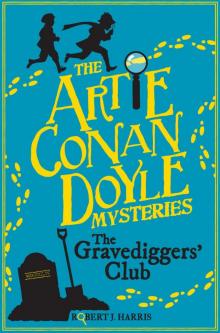 Artie Conan Doyle and the Gravediggers' Club
Artie Conan Doyle and the Gravediggers' Club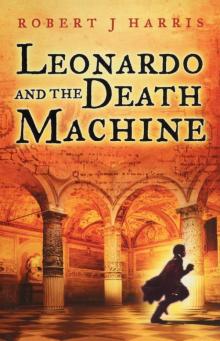 Leonardo and the Death Machine
Leonardo and the Death Machine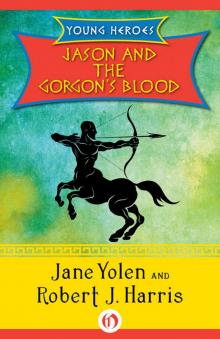 Jason and the Gorgon's Blood
Jason and the Gorgon's Blood Will Shakespeare and the Pirate's Fire
Will Shakespeare and the Pirate's Fire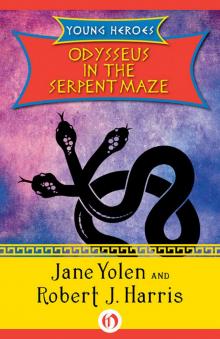 Odysseus in the Serpent Maze
Odysseus in the Serpent Maze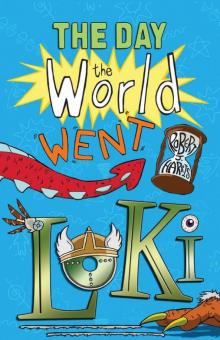 The Day the World Went Loki
The Day the World Went Loki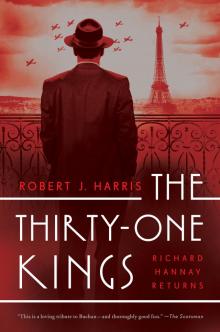 The Thirty-One Kings
The Thirty-One Kings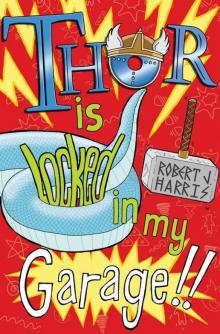 Thor Is Locked in My Garage!
Thor Is Locked in My Garage!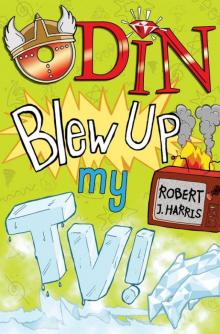 Odin Blew Up My TV!
Odin Blew Up My TV!